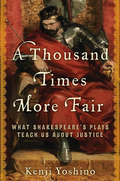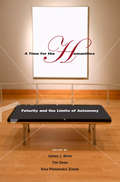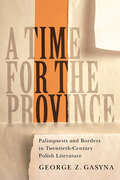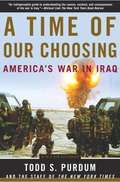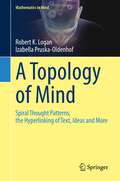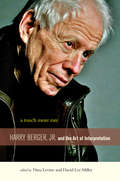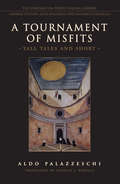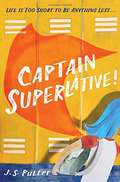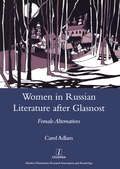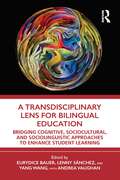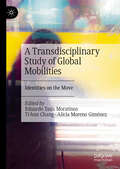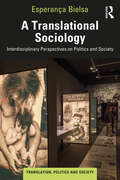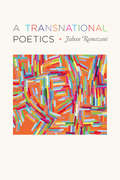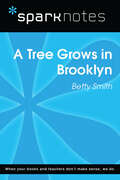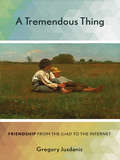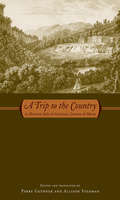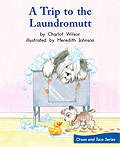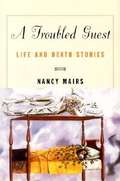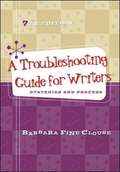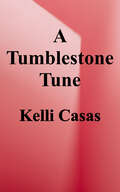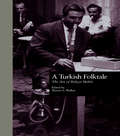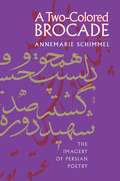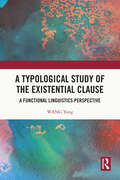- Table View
- List View
A Thousand Times More Fair: What Shakespeare's Plays Teach Us About Justice
by Kenji Yoshino“Fascinating....Loaded with perceptive and provocative comments on Shakespeare’s plots, characters, and contemporary analogs.”—Justice John Paul Stevens, Supreme Court of the United States“Kenji Yoshino is the face and the voice of the new civil rights.”—Barbara Ehrenreich, author of Nickled and DimedA Thousand Times More Fair is a highly inventive and provocative exploration of ethics and the law that uses the plays of William Shakespeare as a prism through which to view the nature of justice in our contemporary lives. Celebrated law professor and author Kenji Yoshino delves into ten of the most important works of the Immortal Bard of Avon, offering prescient and thought-provoking discussions of lawyers, property rights, vengeance (legal and otherwise), and restitution that have tremendous significance to the defining events of our times—from the O.J. Simpson trial to Abu Ghraib. Anyone fascinated by important legal and social issues—as well as fans of Shakespeare-centered bestsellers like Will in the World—will find A Thousand Times More Fair an exceptionally rewarding reading experience.
A Time for the Humanities: Futurity and the Limits of Autonomy
by Tim Dean Ewa Plonowska ZiarekThis book brings together an international roster of renowned scholars from disciplines including philosophy, political theory, intellectual history, and literary studies to address the conceptual foundations of the humanities and the question of their future. What notions of the future, of the human, and of finitude underlie recurring anxieties about the humanities in our current geopolitical situation? How can we think about the unpredictable and unthought dimensions of praxis implicit in the very notion of futurity?The essays here argue that the uncertainty of the future represents both an opportunity for critical engagement and a matrix for invention. Broadly conceived, the notion of invention, or cultural poiesis, questions the key assumptions and tasks of a whole range of practices in the humanities, beginning with critique, artistic practices, and intellectual inquiry, and ending with technology, emancipatory politics, and ethics. The essays discuss a wide range of key figures (e.g., Deleuze, Freud, Lacan, Foucault, Kristeva, Irigaray), problems (e.g., becoming, kinship and the foreign, "disposable populations" within a global political economy, queerness and the death drive, the parapoetic, electronic textuality, invention and accountability, political and social reform in Latin America), disciplines and methodologies (philosophy, art and art history, visuality, political theory, criticism and critique, psychoanalysis, gender analysis, architecture, literature, art). The volume should be required reading for all who feel a deep commitment to the humanities, its practices, and its future.
A Time for the Province: Palimpsests and Borders in Twentieth-Century Polish Literature
by George Z. GasynaWithin discourses on Polish provincial or marginal literature, the eastern borderlands are a richly symbolic region that inspires much fascination and study.Through close readings, surveys, and analyses of transborder narratives by seven modern writers who hailed from the Polish borderlands or set their works there, A Time for the Province demonstrates how the region has come to represent a palimpsest of cultural identities and myths as each new generation unearths and rediscovers them. George Gasyna explores and theorizes the province as a space of grand utopian visions and dystopic gestures about both the Polish past and a Polish future. Offering a novel literary and cultural history of modern Polish writing, he paves the way toward productive new modes of conceptualizing the cultural and literary forms that have come from Central Europe over the last century, challenging many basic assumptions about what this literature can offer its readership in Poland and around the world.Through engagement with the theoretical apparatuses of postmemory studies and border studies, A Time for the Province redefines Polish cultural identity in the current moment of postsocialist transition and globalized citizenship.
A Time of Our Choosing: America's War in Iraq
by Todd S. PurdumIt was a war like no other the United States had ever fought. It began with the bombing of Saddam Hussein’s bunker and ended with statues of the Iraqi dictator being toppled in downtown Baghdad, and it marked a turning point in America’s relations with its enemies, its allies, and its sense of itself. Yet most Americans experienced the war as impressionistic and often confusing—the story of one battle here, one unit there, a report from one city, then another, without the larger context we so urgently needed. Each reporter had his “slice” of the war, it seemed, but no one had the whole story or the broad view. A Time of Our Choosing fills that gap brilliantly, drawing on the unparalleled resources and reportage of The New York Times. Todd S. Purdum, one of the paper’s most gifted storytellers, traces the war in Iraq from the first rumblings after 9/11, to the diplomatic recriminations at the United Nations, to the battles themselves and their aftermath. He deftly rolls out the whole canvas before our eyes, showing how the individual “slices” fit together into a single, gripping drama. Purdum also explores the complex legacy of America’s near-unilateral action. Since the 9/11 attacks, President George W. Bush has vowed that the United States would confront its enemies “at a time of our choosing,” and Purdum shows in vivid terms what this choice has meant for our now transformed world.
A Tolkien Compass
by Jared C. LobdellFor those avid J. R. R. Tolkien fans who have spent time thinking and discussing the moral, religious, psychological, literary and political aspects of The Hobbit and The Lord of the Rings, this book will prove a treat!' ELEVEN ESSAYS AND ARTICLES, INCLUDING: --GOLLUM'S CHARACTER TRANSFORMATION IN THE HOBBIT Examines the extensive revisions Tolkien made in the second hardcover edition of The Hobbit and demonstrates how the character of Gollum is made more evil to fit his later role in the trilogy, --THE CORRUPTION OF POWER A fascinating study of the use and abuse of power as presented by Tolkien. --NARRATIVE PATTERN IN THE FELLOWSHIP OF THE RING In this study of Tolkien's structuring of his fiction, we see how the Master has reversed the usual quest pattern and objectives: instead of seeking an object, Frodo seeks to dispose of one--the ring. The intricacies of Tolkien's puns, the moral geography of Middle-earth, the true character of the Fellowship and the hobbits' friends and foes, the sheer musical beauty of the names Tolkien invents--all are given careful attention. Tolkien's consuming involvement in his books merits this loving exactness. W. H. Auden wrote that he was especially astounded by Tolkien's gift for inventing proper names. Auden would have avidly studied the final offering of this book. For here is a true polestar for all wandering Tolkien fans: Tolkien's own unpublished "Guide to the Names in The Lord of the Rings." Originally, Tolkien prepared the guide for translators of his work. Here, he shares his dragon-hoard of etymological treasures. His asides to the reader on how he came to choose some of the names bring us into Tolkien's own cozy studyroom.
A Topology of Mind: Spiral Thought Patterns, the Hyperlinking of Text, Ideas and More (Mathematics in Mind)
by Robert K. Logan Izabella Pruska-OldenhofThis volume covers many diverse topics related in varying degrees to mathematics in mind including the mathematical and topological structures of thought and communication. It examines mathematics in mind from the perspective of the spiral, cyclic and hyperlinked structures of the human mind in terms of its language, its thoughts and its various modes of communication in science, philosophy, literature and the arts including a chapter devoted to the spiral structure of the thought of Marshall McLuhan. In it, the authors examine the topological structures of hypertext, hyperlinking, and hypermedia made possible by the Internet and the hyperlinked structures that existed before its emergence. It also explores the cognitive origins of mathematical thinking of the human mind and its relation to the emergence of spoken language, and studies the emergence of mathematical notation and its impact on education. Topics addressed include:• The historical context of any topic that involves how mathematical thinking emerged, focusing on archaeological and philological evidence. • Connection between math cognition and symbolism, annotation and other semiotic processes. • Interrelationships between mathematical discovery and cultural processes, including technological systems that guide the thrust of cognitive and social evolution. • Whether mathematics is an innate faculty or forged in cultural-historical context• What, if any, structures are shared between mathematics and language
A Touch More Rare: Harry Berger, Jr., and the Arts of Interpretation
by Harry BergerHarry Berger, Jr., has long been one of our most revered and respected literary and cultural critics. Since the late nineties, a stream of remarkable and innovative publications have shown how very broad his interests are, moving from Shakespeare to baroque painting, to Plato, to theories of early culture.In this volume a distinguished group of scholars gathers to celebrate the work of Harry Berger, Jr. To "celebrate," in Berger's words, is "to visit something either in great numbers or else frequently-to go away and come back, go away and come back, go away and come back. Celebrating is what you do the second or third time around, but not the first. To celebrate is to revisit. To revisit is to revise. Celebration is the eureka of revision." Not only former students but distinguished colleagues and scholars come together in these pages to discover Berger's eurekas-to revisit the rigor and originality of his criticism, and occasionally to revise its conclusions, all through the joy of strenuous engagement. Nineteen essays on Berger's Shakespeare, his Spenser, his Plato, and his Rembrandt, on his theories of interpretation and cultural change and on the ethos of his critical and pedagogical styles, open new approaches to the astonishing ongoing body of work authored by Berger. An introduction by the editors and an afterword by Berger himself place this festival of interpretation in the context of Berger's intellectual development and the reception of his work from the mid-twentieth century into the first decade of the twenty-first.
A Tournament of Misfits
by Aldo Palazzeschi Nicolas J. PerellaAldo Palazzeschi (1885-1974) is arguably the major twentieth-century Italian writer who has been most neglected by the English-speaking world. Born in Florence and trained as an actor, Palazzeschi ranks high as a poet and fiction writer in his homeland. His work, which attempts to recreate the experience of a spectator watching and listening to a character on stage, won him the praise of F.T. Marinetti, the founder of Italian futurism, who enrolled the young poet in his avant-garde coterie despite the fact that, stylistically, Palazzeschi's work had little in common with futurism.A Tournament of Misfits brings together a selection of Palazzeschi's short fiction for the first time in English. Through clear and fluid translations, Nicolas J. Perella demonstrates Palazzeschi's use of laughter to debunk social and literary myths. As a social being, Palazzeschi felt himself a deviant, but he was saved from a self-destructive bitterness by his capacity for irony, which he often directed at himself as well as at others. Yet, it would be a mistake not to see the desperate yearning for liberation from society's rigid code behind the irony and the fun in Palazzeschi's work. With this translation, Perella brings Palazzeschi to life for a new audience to appreciate.
A Tower of Giraffes: Animal Bunches
by Anna WrightA drove of pigs, a romp of otters, an ostentation of peacocks, and a tower of giraffes. . . . This clever book introduces young readers to some of the words we use to refer to animals in a group. The ink, watercolor, and fabric collage art is brightly colored and uniquely sets this fun book apart from the crowd. Each page presents information about an animal and its group behavior, such as how geese fly in a V-shape and honk to encourage the leaders, and that sometimes tens of thousand of flamingos meet up in one location. <P><P>Lexile Measure: AD940L
A Tradition of Infringement: Women in Russian Literature After Glasnost
by Carol Adlam"The Russian literary world was shaken by the wide-reaching reforms of the late Soviet period (1985-91) and the Soviet Union's subsequent collapse. During this time the phenomenon of 'alternative' literature emerged, characterized by an emphasis on thematic, structural, and linguistic transgression of both Soviet-era values and the enduring Russian tradition of civic engagement and moral edification through literature. Through close textual analysis, Adlam examines the relationship of this literary phenomenon to issues of gender and creative authority, providing detailed discussion of several of the most significant women writers of the period, among them Valeriia Narbikova, Liudmila Petrushevskaia and Nina Sadur."
A Transdisciplinary Lens for Bilingual Education: Bridging Cognitive, Sociocultural, and Sociolinguistic Approaches to Enhance Student Learning
by Yang Wang Eurydice Bauer Lenny Sánchez Andrea VaughanAddressing the intersections between cognitive, sociocultural, and sociolinguistic research, this volume explores bilingual development across educational contexts to discuss and uncover the influences and impact of language in school programming and everyday practices. Confronting a standard monolingual lens, this collection highlights the importance of applying cross-disciplinary approaches to examine bilingualism in relation to topics such as language politics, linguistic identities, students’ experiences at home and in schools, asset-based teaching and curricula, and overall benefits. Ideal for courses in bilingualism, literacy, psychology, and language education, this text is an important resource for understanding and applying transdisciplinary, inclusive approaches to positively influence cognitive development, academic learning, and identity formation in bilingual education.
A Transdisciplinary Study of Global Mobilities: Identities on the Move
by Eduardo Tasis Moratinos Ti-Han Chang Alícia Moreno GiménezIdentities on the Move interrogates the categories given and adopted by people on the move through a transdisciplinary and global approach that includes social and political sciences and the arts. It brings together experiences of displacement from a variety of cultural and national backgrounds, including Brazilians, Chinese, Koreans, South Italians, Africans, Muslims, Arabophobe migrants, Iranians, Pakistanis, Bosnians, Latin Americans and Eastern Europeans. It looks at their identity-negotiating processes in different geographies across the globe, namely Japan, UK, Palestine, Italy, Australia, Europe and North America. This multi-geographical and multi-disciplinary approach allows us to decentralise previous narratives of migration by reformulating them against coloniality and invisibility and presenting them within a richer and changing contemporary map of dynamic identities. The global scale of the case studies included in this volume also allows for a wider exploration of thematic concepts within the (trans)formation of displaced identities, such as assimilation versus alienation, memory and trauma, stigmatisation, enculturation, acculturation and deculturation. In a nutshell, this volume highlights current complexities of identity formation in a global scene that is moving away from homogenous nations by presenting a multi-layered and multi-spatial notion of belonging.
A Translational Sociology: Interdisciplinary Perspectives on Politics and Society (Translation, Politics and Society)
by Esperança BielsaA Translational Sociology provides an interdisciplinary investigation of the key role of translation in society. There is a growing recognition of translation’s intervention in the intellectual history of sociology, in the international reception of social theory, and in approaches to the global literary and academic fields. This book brings attention to aspects of translation that have remained more elusive to sociological interpretation and analysis, investigating translation’s ubiquitous presence in the everyday lives of ordinary people in increasingly multilingual societies and its key intervention in mediating politics within and beyond the nation. In order to challenge a reductive view of translation as a relatively straightforward process of word substitution that is still prevalent in the social sciences, this book proposes and develops a broader definition of translation as a social relation across linguistic difference, a process of transformation that leaves neither its agent nor its object unchanged. The book offers elaborations of the social, cultural and political implications of such an approach, as a broad focus on these various perspectives and their interrelations is needed for a fuller understanding of translation’s significance in the contemporary world. This is key reading for advanced students and researchers of translation studies, social theory, cultural sociology and political sociology.
A Transnational Poetics
by Jahan RamazaniPoetry is often viewed as culturally homogeneous—“stubbornly national,” in T. S. Eliot’s phrase, or “the most provincial of the arts,” according to W. H. Auden. But in A Transnational Poetics, Jahan Ramazani uncovers the ocean-straddling energies of the poetic imagination—in modernism and the Harlem Renaissance; in post–World War II North America and the North Atlantic; and in ethnic American, postcolonial, and black British writing. Cross-cultural exchange and influence are, he argues, among the chief engines of poetic development in the twentieth and twenty-first centuries. Reexamining the work of a wide array of poets, from Eliot, Yeats, and Langston Hughes to Elizabeth Bishop, Lorna Goodison, and Agha Shahid Ali, Ramazani reveals the many ways in which modern and contemporary poetry in English overflows national borders and exceeds the scope of national literary paradigms. Through a variety of transnational templates—globalization, migration, travel, genre, influence, modernity, decolonization, and diaspora—he discovers poetic connection and dialogue across nations and even hemispheres.
A Tree Grows in Brooklyn (SparkNotes Literature Guide Series)
by SparkNotesA Tree Grows in Brooklyn (SparkNotes Literature Guide) by Betty Smith Making the reading experience fun! Created by Harvard students for students everywhere, SparkNotes is a new breed of study guide: smarter, better, faster. Geared to what today's students need to know, SparkNotes provides: *Chapter-by-chapter analysis *Explanations of key themes, motifs, and symbols *A review quiz and essay topicsLively and accessible, these guides are perfect for late-night studying and writing papers
A Tremendous Thing: Friendship from the "Iliad" to the Internet
by Gregory Jusdanis"Why did you do all this for me?" Wilbur asked. "I don't deserve it. I've never done anything for you." “You have been my friend,” replied Charlotte. “That in itself is a tremendous thing.” —from Charlotte's Web by E. B. White Friendship encompasses a wide range of social bonds, from playground companionship and wartime camaraderie to modern marriages and Facebook links. For many, friendship is more meaningful than familial ties. And yet it is our least codified relationship, with no legal standing or bureaucratic definition. In A Tremendous Thing, Gregory Jusdanis explores the complex, sometimes contradictory nature of friendship, reclaiming its importance in both society and the humanities today. Ranging widely in his discussion, he looks at the art of friendship and friendship in art, finding a compelling link between our need for friends and our engagement with fiction. Both, he contends, necessitate the possibility of entering invented worlds, of reading the minds of others, and of learning to live with people. Investigating the ethics, aesthetics, and politics of friendship, Jusdanis draws from the earliest writings to the present, from the Epic of Gilgamesh and the Iliad to Charlotte's Web and “Brokeback Mountain,” as well as from philosophy, sociology, evolutionary biology, psychology, and political theory. He asks: What makes friends stay together? Why do we associate friendship with mourning? Does friendship contribute to the formation of political communities? Can friends desire each other? The history of friendship demonstrates that human beings are a mutually supportive species with an innate aptitude to envision and create ties with others. At a time when we are confronted by war, economic inequality, and climate change, Jusdanis suggests that we reclaim friendship to harness our capacity for cooperation and empathy.
A Trip to the Country: by Henriette-Julie de Castelnau, Comtesse de Murat
by Perry Gethner Allison Stedman Henriette-Julie de Castelnau Comtesse De MuratTranslates an important example of late seventeenth-century French hybrid experimental fiction that provided the primary literary backdrop for the first French fairy tales.
A Trip to the Laundromutt (Fountas & Pinnell LLI Green #Level H, Lesson 110)
by Charlot WilsonFountas and Pinnell Leveled Literacy Intervention Green System -- 1st Grade
A Trip to the Zoo: A Grammar Tales Book to Support Grammar and Language Development in Children (Grammar Tales)
by Jessica HabibPete and Jem are having lots of fun at the zoo, but they both want to see different animals, and are pulling their mother in different directions! Targeting Subject-Verb-Object sentences and regular plurals, this book provides repeated examples of early developing syntax and morphology which will engage and excite the reader while building pre-literacy skills and make learning fun, as well as exposing children to multiple models of the target grammar form. Perfect for a speech and language therapy session, this book is an ideal starting point for targeting client goals and can also be enjoyed at school or home to reinforce what has been taught in the therapy session.
A Troubled Guest: Life and Death Stories
by Nancy MairsFew have succeeded so well in illuminating the paradox of living with the reality of death as essayist Nancy Mairs in this unflinching look at assisted suicide, the death penalty, and other life-and-death decisions.
A Troubleshooting Guide For Writers: Strategies And Process (Seventh Edition)
by Barbara Fine ClouseA Troubleshooting Guide for Writers is a compendium of strategies for handling all aspects of writing, from prewriting through editing. Designed for use independently by students as a resource book or as an in-class text, A Troubleshooting Guide for Writers helps students discover specific strategies for improving their writing processes and for solving specific writing problems. Known for its concise, effective coverage and student-friendly style, A Troubleshooting Guide for Writers offers an exceptional variety of writing strategies for students.
A Tumblestone Tune
by Kelli CasasThis book is a wonderful role-play reading adventure! Playbook stories are presented in a unique and colorful format and are read out loud by several readers like a play, without memorization, props, or a stage. <p><p>When you read the book, you and other readers bring the story to life and become the characters. As you read your part out loud, you will have fun expressing and acting like your character. You and the other readers will explore the story plot together and learn what will happen next. It's an exciting journey of discovery that pulls you into the story, and you'll want to read it out loud again and again! <p><p>Begin your reading adventure with the Character Summary at the beginning of the book. You'll notice right away that the words and sentences for each character appear in a different color here and throughout the book. This will make it easy to follow along and read your part with confidence and enthusiasm.
A Turkish Folktale: The Art of Behet Mahir (World Folktale Library #Vol. 4)
by Warren S. WalkerFirst published in 1996. Routledge is an imprint of Taylor & Francis, an informa company.
A Two-Colored Brocade
by Annemarie SchimmelAnnemarie Schimmel, one of the world's foremost authorities on Persian literature, provides a comprehensive introduction to the complicated and highly sophisticated system of rhetoric and imagery used by the poets of Iran, Ottoman Turkey, and Muslim India. She shows that these images have been used and refined over the centuries and reflect the changing conditions in the Muslim world.According to Schimmel, Persian poetry does not aim to be spontaneous in spirit or highly personal in form. Instead it is rooted in conventions and rules of prosody, rhymes, and verbal instrumentation. Ideally, every verse should be like a precious stone--perfectly formed and multifaceted--and convey the dynamic relationship between everyday reality and the transcendental.Persian poetry, Schimmel explains, is more similar to medieval European verse than Western poetry as it has been written since the Romantic period. The characteristic verse form is the ghazal--a set of rhyming couplets--which serves as a vehicle for shrouding in conventional tropes the poet's real intentions.Because Persian poetry is neither narrative nor dramatic in its overall form, its strength lies in an "architectonic" design; each precisely expressed image is carefully fitted into a pattern of linked figures of speech. Schimmel shows that at its heart Persian poetry transforms the world into a web of symbols embedded in Islamic culture.
A Typological Study of the Existential Clause: A Functional Linguistics Perspective
by Wang YongThis book investigates the existential clause (EC) from a cross-linguistic perspective and within the framework of Systemic Functional Linguistics.The prototypical EC in the less familiar languages is identified through its functional equivalents in the more familiar ones, which share the common semantic basis of ‘there exists something in some location’. Topics addressed include the morpho-syntactic features of the EC, the subject of the EC, the definiteness effect and its manifestations in the EC, the EC as impersonals, the distinction between entity- vs. event-existentials, and the EC and its related constructions. Drawing on both cross-linguistic observations based on the language sample and in-depth investigations in particular languages (e.g., in Chinese and English), the study aims to unravel how the lexico-grammar of EC is related to its meanings and functions, that is, how meaning is realised in form.The title will appeal to scholars and students in the field of linguistics, especially functional linguistics, and syntax.
